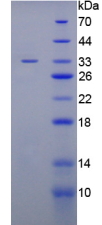Active Inter Alpha-Globulin Inhibitor H4 (ITIH4)
IHRP; PK120; H4P; ITIHL1; Plasma Kallikrein-Sensitive Glycoprotein; Plasma kallikrein sensitive glycoprotein 120; Inter-alpha-trypsin inhibitor family heavy chain-related protein
- Product No.APH776Hu03
- Organism SpeciesHomo sapiens (Human) Same name, Different species.
- Buffer Formulation20mM Tris, 150mM NaCl, pH8.0, containing 1mM EDTA, 1mM DTT, 0.01% SKL, 5% Trehalose and Proclin300.
- Traits Freeze-dried powder
- Purity> 97%
- Isoelectric Point6.9
- ApplicationsCell culture; Activity Assays.
- DownloadInstruction Manual
- UOM 10µg50µg 200µg 1mg 5mg
- FOB
US$ 288
US$ 720
US$ 1440
US$ 4320
US$ 10800
For more details, please contact local distributors!
ACTIVITY TEST

Figure. The binding activity of ITIH4 with Grb2.
Inter Alpha-Globulin Inhibitor H4 (ITIH4) is secreted into the blood, where it is cleaved by plasma kallikrein into two smaller forms. ITIH4 has been detected only in liver, and it seems to be upregulated during surgical trauma. It may also play a role in liver development or regeneration. Besides, Growth Factor Receptor Bound Protein 2 (Grb2) has been identified as an interactor of ITIH4, thus a binding ELISA assay was conducted to detect the interaction of recombinant human ITIH4 and recombinant human Grb2. Briefly, ITIH4 were diluted serially in PBS with 0.01% BSA (pH 7.4). Duplicate samples of 100uL were then transferred to
Grb2-coated microtiter wells and incubated for 2h at 37℃. Wells were washed with PBST and incubated for 1h with anti-ITIH4 pAb, then aspirated and washed 3 times. After incubation with HRP labelled secondary antibody, wells were aspirated and washed 3 times. With the addition of substrate solution, wells were incubated 15-25 minutes at 37℃. Finally, add 50µL stop solution to the wells and read at 450nm immediately. The binding activity of ITIH4 and Grb2 was shown in Figure 1, and this effect was in a dose dependent manner.
USAGE
Reconstitute in 20mM Tris, 150mM NaCl (pH8.0) to a concentration of 0.1-1.0 mg/mL. Do not vortex.
STORAGE
Avoid repeated freeze/thaw cycles. Store at 2-8°C for one month. Aliquot and store at -80°C for 12 months.
STABILITY
The thermal stability is described by the loss rate. The loss rate was determined by accelerated thermal degradation test, that is, incubate the protein at 37°C for 48h, and no obvious degradation and precipitation were observed. The loss rate is less than 5% within the expiration date under appropriate storage condition.
GIVEAWAYS
INCREMENT SERVICES
-
 BCA Protein Quantification Kit
BCA Protein Quantification Kit
-
 Molecular Mass Marker for Protein
Molecular Mass Marker for Protein
-
 Monoclonal Antibody Customized Service
Monoclonal Antibody Customized Service
-
 Polyclonal Antibody Customized Service
Polyclonal Antibody Customized Service
-
 Protein Activity Test Experiment Service
Protein Activity Test Experiment Service
-
 Electrophoretic Mobility Shift Assay (EMSA) Experiment Service
Electrophoretic Mobility Shift Assay (EMSA) Experiment Service
-
 Buffer
Buffer
-
 Lentivirus Packaging Experiment Service
Lentivirus Packaging Experiment Service
-
 Adenovirus Packaging Experiment Service
Adenovirus Packaging Experiment Service
-
 Real Time PCR Experimental Service
Real Time PCR Experimental Service
-
 Spike RBD Protein (S-RBD)
Spike RBD Protein (S-RBD)
-
 Protein G
Protein G
-
 Protein A
Protein A
| Magazine | Citations |
| Toxicology Letters | Biomarkers for methotrexate-induced liver injury: urinary protein profiling of psoriasis patients. Pubmed: 23830989 |
| International Journal of Medical Microbiology | Proteomic demonstration of the recurrent presence of inter-alpha-inhibitor H4 heavy-chain during aspergillosis induced in an animal model Pubmed:24360996 |
| Cancer Research and Treatment | Inter-alpha Inhibitor H4 as a Potential Biomarker Predicting the Treatment Outcomes in Patients with Hepatocellular Carcinoma pubmed:28724284 |
| Diagnostics | Systemic Alterations of Immune Response-Related Proteins during Glaucoma Development in the Murine Model DBA/2J Pubmed: 32585848 |
| Liver Cancer | Biomarkers for locally advanced hepatocellular carcinoma patients treated with liver-directed combined radiotherapy |








